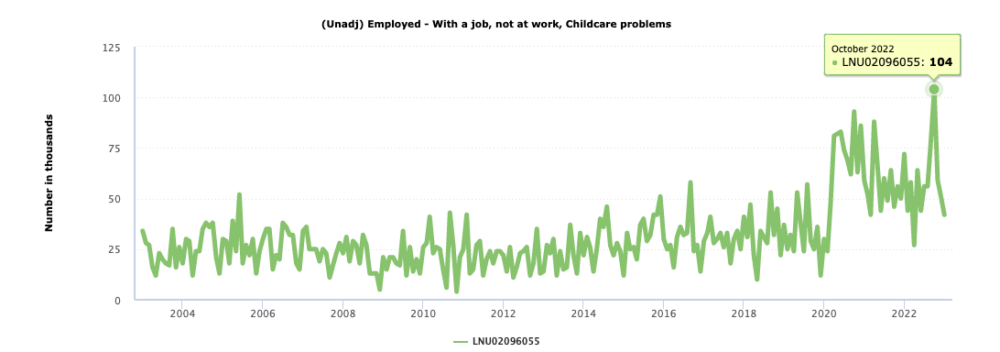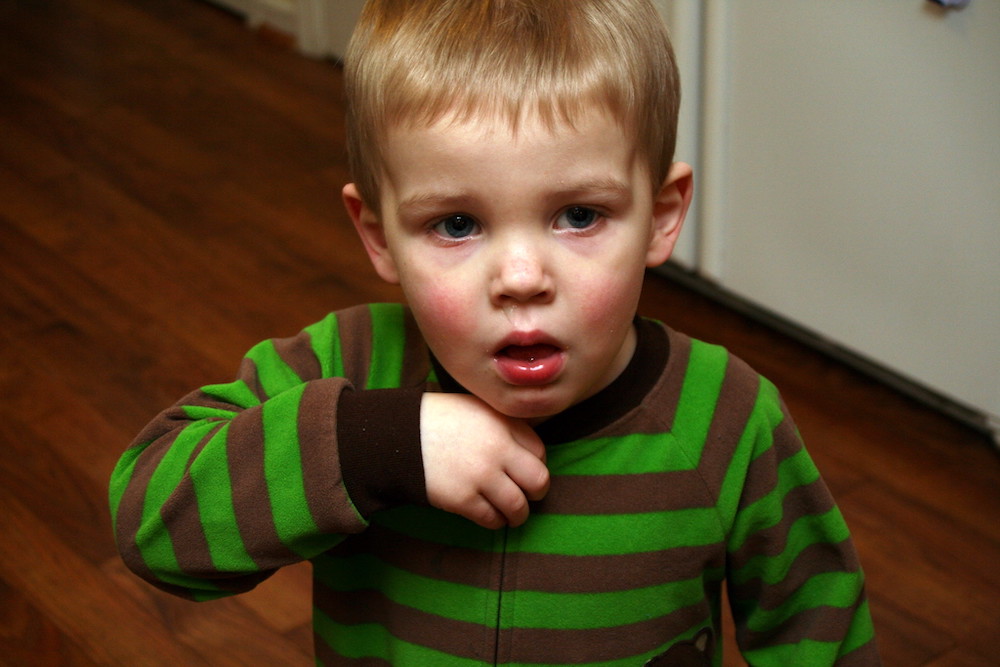Hold your judgment for a moment. We were in our small rowhome bathroom, where the shower was blasting hot water to steam up my kid’s congested nose. The night before, my newborn was diagnosed with bronchiolitis, likely caused by RSV caught from my toddler — who started daycare six months ago and has gone from one cold to another ever since.
After I tried to clear the newborn’s breathing, I stumbled in the dark to cover the kid’s nose and mouth with a nebulizer mask so they could breathe a medicated vapor. They screamed loudly and consistently enough that I was sure the toddler would wake up.
That’s when I remembered: I have an especially busy day at work tomorrow.
We repeated the process four hours later — and will keep up this brutal course for a week.
Are more kids getting sick? What does that mean for working parents?
Sick kids and weary parents aren’t new. Young kids can routinely have a dozen colds a year, according to medical researchers, which strains parents who have additional care responsibilities and are likely to be infected themselves. But this winter was different: Experts dubbed the season the “Tripledemic,” with rising cases of COVID, influenza and RSV.

Chart showing evolution of parents missing work for “childcare problems.” (Courtesy image from Bureau of Labor Statistics)
In October 2022, 104,000 Americans missed work because of “childcare problems” — the highest total since the Bureau of Labor Statistics began tracking the figure in 2003. Though that figure is now off its all-time high, it has remained above historic levels. This number also, of course, misses a whole range of less formal ways parents care for sick kids during the workweek. Funny what a pandemic can do.
This isn’t just a problem for parents. When 2 in 5 American households have kids under 18 and most parents are working, their workplace absences are an economy-wide challenge and acutely familiar for employers. This season has been historically bad for intuitive reasons. During two years of pandemic-motivated social distancing, kids were exposed to much less infection. This season, that ongoing pandemic conspired with a surge in overdue transmission — our so-called “immunity debt” or “immunity gap.”
I know it well. My toddler was born in the pandemic’s early days (which taught me about good parental leave) and never had so much as a runny nose for the first 18 months. Daycare changed that. In contrast, our newborn has only lived during the Tripledemic and therefore has practically never been fully healthy a single day.
Analysts don’t predict we’ll remain at these elevated levels; kids weren’t getting sick more often before the pandemic and we’ll eventually close today’s immunity gap. But as our relationship to work shifts in the pandemic, the importance for employers won’t go away.
How can employers support working parents with sick kids?
Enough Americans are working parents that building a workplace that welcomes them is sound recruiting strategy — Read Technical.ly’s introduction to a parent-friendly workplace. As we’ve reported, parenting in a pandemic is a nightmare and childcare costs are ballooning — all trickier still for working moms — so this offers employers a shot at differentiation.
One way to support your parent workforce, especially those with younger kids, is simply recognizing those kids get sick. Professionals who can work from home have a considerable advantage over those who can’t. A FlexJobs survey reported that two-thirds of working parents called remote options a top workplace need. It makes all the difference to be able to take that midday pediatrician’s appointment. Let your parent-workers do that.
A related key tool for supporting such parents is to welcome variable work hours — asynchronous work, in the jargon. Employers might prioritize core hours while accepting a parent juggling a sick kid at home. As I like to think of it: Working until 10 p.m. is a problem but working at 10 p.m. might not be if it’s part of a rearranged schedule.
For example, I worked at midnight a lot this last week but haven’t actually logged much more than 40 hours. Instead, I’ve balanced needing to support a sick kid during the day. As we’ve reported, kids’ schedules never matched with parent work. It just gets trickier when they’re sick.
The trouble is that many companies are backtracking on pandemic-era flexible work gains. Resist the urge.
Let’s be obvious: when parents are at home with young, sick kids, they aren’t likely their most productive selves. That’s OK when that parent is also a key employee. If they contribute over time, it’s worth the worst weeks of sick season. It’s alright to expect your team to perform, but consider a longer trend than the Tripledemic.
That’s even truer when the working parent gets sick, as those with young children do more often than others. Kids get sick because they expose themselves to many germs (my toddler has had boogers rubbed on her by a daycare classmate) and lack adults’ ability to battle off infections. Parents then often get infected too because they don’t have lifelong immunity to every weird bug their snotty kid picks up — and, yes, parents of young kids are typically less well-rested and in worse shape than their peers without kids, or with older ones. Childcare options play a role too.
“Young children in daycare appear to have more colds than children cared for at home,” but that really does come with a benefit, as a professor of pediatrics told Vox in 2016. “When daycare-attending children grow older and enter primary school with their peers who did not attend daycare, the children who attended daycare are less vulnerable to colds than those who did not.”
That’s good to hear because I’ve told myself that must be true every day for the last six months. It’s also good for employers who invest in long-tenured parent workers (older workers do tend to stay around longer than younger ones).
As every parent knows, young kids grow up fast. At that moment, my newborn’s shouting and vapor treatment seemed worse than the disease. But parents of young children quickly become parents of slightly more dependable school-age kids. Then those kids become difficult teenagers and flourish into interesting and productive adults.
Employers are lucky for working parents to trade their limited time and creativity for a bit of money. Make that easier whenever you can.
Sign up for the Culture Builder newsletter
Written by Technically Media CEO Chris Wink, Technical.ly’s Culture Builder newsletter features tips on growing powerful teams and dynamic workplaces. Below is the latest edition we published. Sign up to get the next one.
Before you go...
Please consider supporting Technical.ly to keep our independent journalism strong. Unlike most business-focused media outlets, we don’t have a paywall. Instead, we count on your personal and organizational support.
Join our growing Slack community
Join 5,000 tech professionals and entrepreneurs in our community Slack today!

The person charged in the UnitedHealthcare CEO shooting had a ton of tech connections

From rejection to innovation: How I built a tool to beat AI hiring algorithms at their own game

Where are the country’s most vibrant tech and startup communities?


